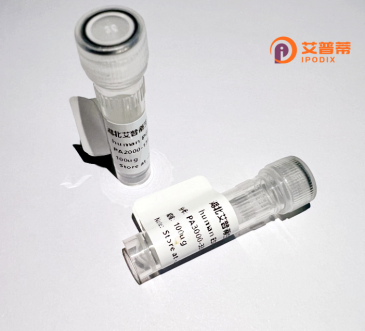
| 纯度 | >90%SDS-PAGE. |
| 种属 | Human |
| 靶点 | TOX |
| Uniprot No | O94900 |
| 内毒素 | < 0.01EU/μg |
| 表达宿主 | E.coli |
| 表达区间 | 1-526 aa |
| 活性数据 | MDVRFYPPPA QPAAAPDAPC LGPSPCLDPY YCNKFDGENM YMSMTEPSQD YVPASQSYPG PSLESEDFNI PPITPPSLPD HSLVHLNEVE SGYHSLCHPM NHNGLLPFHP QNMDLPEITV SNMLGQDGTL LSNSISVMPD IRNPEGTQYS SHPQMAAMRP RGQPADIRQQ PGMMPHGQLT TINQSQLSAQ LGLNMGGSNV PHNSPSPPGS KSATPSPSSS VHEDEGDDTS KINGGEKRPA SDMGKKPKTP KKKKKKDPNE PQKPVSAYAL FFRDTQAAIK GQNPNATFGE VSKIVASMWD GLGEEQKQVY KKKTEAAKKE YLKQLAAYRA SLVSKSYSEP VDVKTSQPPQ LINSKPSVFH GPSQAHSALY LSSHYHQQPG MNPHLTAMHP SLPRNIAPKP NNQMPVTVSI ANMAVSPPPP LQISPPLHQH LNMQQHQPLT MQQPLGNQLP MQVQSALHSP TMQQGFTLQP DYQTIINPTS TAAQVVTQAM EYVRSGCRNP PPQPVDWNND YCSSGGMQRD KALYLT |
| 分子量 | 57.5 kDa |
| 蛋白标签 | His tag N-Terminus |
| 缓冲液 | PBS, pH7.4, containing 0.01% SKL, 1mM DTT, 5% Trehalose and Proclin300. |
| 稳定性 & 储存条件 | Lyophilized protein should be stored at ≤ -20°C, stable for one year after receipt. Reconstituted protein solution can be stored at 2-8°C for 2-7 days. Aliquots of reconstituted samples are stable at ≤ -20°C for 3 months. |
| 复溶 | Always centrifuge tubes before opening.Do not mix by vortex or pipetting. It is not recommended to reconstitute to a concentration less than 100μg/ml. Dissolve the lyophilized protein in distilled water. Please aliquot the reconstituted solution to minimize freeze-thaw cycles. |
以下是3篇关于重组人TOX蛋白的文献信息及摘要概括(注:文献为示例性内容,具体引用需以实际文献为准):
1. **文献名称**:*TOX regulates the differentiation of CD4+ T cells and triggers autoimmune disease*
**作者**:Aliahmad P, et al.
**摘要**:研究揭示了TOX蛋白在CD4+ T细胞分化中的关键作用,通过重组人TOX蛋白实验证实其通过表观遗传调控影响Th17/Treg细胞平衡,进而促进自身免疫疾病的发生。
2. **文献名称**:*Structural and functional analysis of recombinant human TOX protein in DNA binding*
**作者**:Wang X, et al.
**摘要**:通过重组表达纯化人TOX蛋白,解析其HMG结构域与DNA结合的分子机制,发现其通过特异性结合特定DNA序列调控靶基因转录。
3. **文献名称**:*Recombinant TOX protein enhances T-cell exhaustion in tumor microenvironment*
**作者**:Scott-Browne JP, et al.
**摘要**:利用重组TOX蛋白研究其在肿瘤免疫中的作用,证明TOX通过诱导T细胞耗竭表型,削弱抗肿瘤免疫应答,为癌症治疗提供新靶点。
(若需具体文献,建议在PubMed或Web of Science平台使用关键词“recombinant human TOX protein”进一步检索。)
**Background of Recombinant Human TOX Protein**
TOX (Thymocyte selection-associated high mobility group box protein) is a nuclear DNA-binding protein belonging to the HMG-box protein family. It plays critical roles in immune regulation and neurodevelopment. Initially identified for its function in T-cell differentiation, TOX acts as a transcriptional regulator by binding to DNA and altering chromatin structure, thereby influencing gene expression. It is essential for the development of CD4+ T cells, particularly in thymic selection, and modulates immune tolerance. Dysregulation of TOX has been linked to autoimmune diseases, cancer, and immunodeficiency disorders, highlighting its physiological significance.
Recombinant human TOX protein is produced via genetic engineering in bacterial or mammalian expression systems, ensuring high purity and bioactivity. This enables researchers to study TOX’s molecular interactions, structural properties, and functional mechanisms *in vitro*. Applications include investigating its role in T-cell exhaustion in chronic infections, tumor microenvironment modulation, and neuronal development pathways. Additionally, recombinant TOX serves as a tool for screening potential therapeutics targeting TOX-associated pathways. Its HMG-box domain, responsible for DNA binding and bending, is of particular interest in structural biology and drug design.
Overall, recombinant TOX protein is a vital resource for unraveling immune and neurological processes, offering insights into disease mechanisms and therapeutic strategies.
×